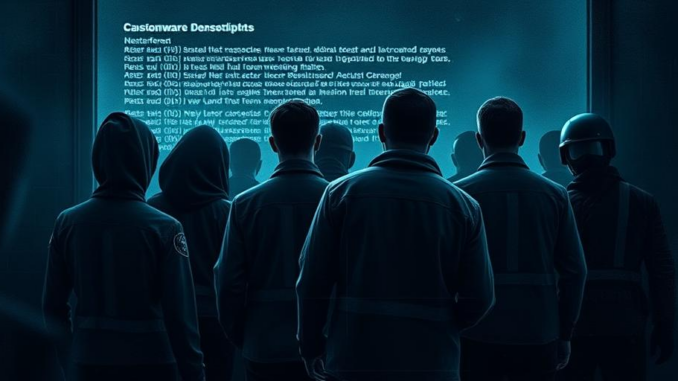
Summary
International law enforcement agencies, in a coordinated operation, have successfully disrupted the 8Base ransomware network, arresting four suspects and seizing critical infrastructure. The operation, codenamed “Phobos Aetor,” involved authorities from 14 countries and resulted in the seizure of 8Base’s dark web domains, disrupting their operations and potentially preventing future attacks. This takedown underscores the growing international cooperation in combating the escalating threat of ransomware.
Explore the data solution with built-in protection against ransomware TrueNAS.
Main Story
So, I saw this interesting piece of news the other day – apparently, the 8Base ransomware group, you know, the ones notorious for using the Phobos ransomware, they’ve finally been taken down. Good news, right? A coordinated international law enforcement operation did the trick, and about time, I say! They’ve been a real pain.
Four suspects, two men and two women – all European nationals – were apprehended in Phuket, Thailand. Can you imagine? Phuket! Sounds a bit too relaxing for cybercriminals if you ask me. This operation, codenamed “Phobos Aetor,” involved a whopping 14 countries. The result? The seizure of 8Base’s dark web domains, 27 servers, and a bunch of other devices, seriously messing with their ability to operate.
Now, two of the suspects, identified as Russian nationals – Roman Berezhnoy, 33, and Egor Nikolaevich Glebov, 39 – are facing charges in the US. They’re accused of carrying out ransomware attacks from May 2019 to October 2024, and get this, they allegedly victimized over 1,000 entities and extorted more than $16 million in ransom! It’s crazy the scale some of these groups operate on.
8Base typically targeted small to medium-sized businesses globally, and often focused on the US, UK, and Brazil. They were basically preying on those with weaker cybersecurity defenses. Their methods? Phishing emails, exploit kits, and drive-by downloads. The basics, really, but effective enough to get them in the door. While individual ransom demands weren’t usually huge, it was the sheer volume of attacks that raked in the cash. You can imagine how frustrating that must be for those SMBs though. I worked with one a few years ago, and their security was frankly terrible, they had no idea how much risk they were at.
Interestingly, law enforcement thinks 8Base and another group, RansomHouse, might be connected. Apparently, they’ve noticed similarities in their online infrastructure and ransom notes. Who knows for sure, but it’s definitely something to keep an eye on. Phobos ransomware itself, which operates on a Ransomware-as-a-Service (RaaS) model, emerged back in 2018. This RaaS model basically allows anyone, from lone wolves to big criminal syndicates, to deploy ransomware relatively easily. And that’s why it’s such a persistent threat. They don’t have to be experts!
But there’s more good news. Thanks to this operation, law enforcement was able to warn over 400 companies worldwide about potential ransomware attacks. It’s not just about catching the bad guys; it’s about proactively preventing attacks before they happen. This is a much more effective way to go about things, if you ask me. I’ve always thought we need to be more proactive in cybersecurity, not just reactive.
This whole thing really shows how effective international collaboration can be in fighting cybercrime. And it’s crucial for protecting businesses from the devastating impacts of ransomware attacks. Plus, it sends a clear message: law enforcement is serious about bringing these guys to justice. The fight, of course, isn’t over. New groups and tactics are constantly popping up. So, it is vital to stay informed about the latest threats and to invest in robust cybersecurity measures, especially with ransomware on the rise. I mean it’s just common sense, and it starts with the basics: regular software updates, strong passwords, multi-factor authentication, and good employee training on cybersecurity. It’s not rocket science!
Don’t forget about data backups! Having a solid data backup and recovery plan is essential. It can be the difference between paying a ransom and simply restoring your systems without giving the criminals a dime. Seeing the increasing involvement of international law enforcement and the successful disruption of groups like 8Base offers a bit of hope. But, the continued evolution of ransomware means we all need to stay vigilant and proactive if we want to keep pace with these evolving threats. So, what do you think, are we winning this war or just fighting a holding action?


Phuket, huh? Cybercriminals with a taste for beaches and Mai Tais. I wonder if “upgraded cybersecurity” will now include mandatory beach umbrella-holding lessons? Seems crucial for deflecting phishing attacks while sunbathing.
Haha, that’s a great point! Maybe “cybersecurity resorts” will be the next big thing, offering advanced threat protection alongside umbrella-wielding skills. A relaxing way to stay secure! The authorities may have spoiled their holiday somewhat!
Editor: StorageTech.News
Thank you to our Sponsor Esdebe
The potential connection between 8Base and RansomHouse highlights the complex relationships within the cybercrime ecosystem. Understanding these affiliations is crucial for developing more effective preventative strategies and disrupting future attacks. Are there specific indicators or patterns that consistently link these groups?
That’s a great question! The potential links between 8Base and RansomHouse are definitely worth exploring further. Besides infrastructure similarities, some researchers are looking into overlaps in victimology and shared TTPs (Tactics, Techniques, and Procedures). Uncovering consistent patterns would be a game-changer for proactive threat intel!
Editor: StorageTech.News
Thank you to our Sponsor Esdebe
Phuket? Seriously? I guess even cybercriminals need a vacation. I wonder if the seized servers had any vacation photos on them? Maybe a nice beach sunset or two?